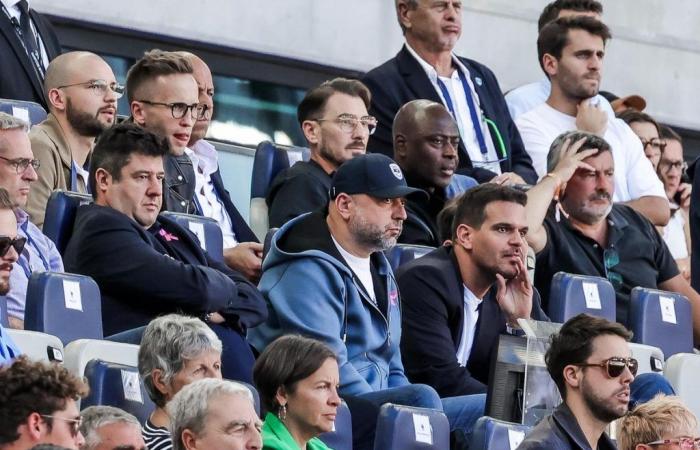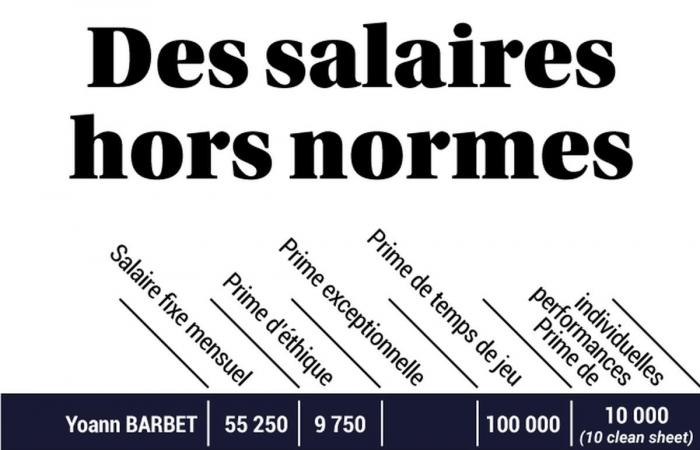Un operating deficit of 54 million euros, a net loss (after taking into account transfers) of almost 41 million euros: as of June 30, the Girondins finished the 2023/2024 season with bloodless finances. Combined with considerable debt (118 million according to a provisional estimate from the commercial court at the beginning of August), this situation led the club to be placed in receivership this summer, then to be administratively demoted from Ligue 2 to National 2.
For years, Bordeaux has been structurally in deficit. The successive owners (M6, King Street then Gérard Lopez) took it upon themselves to plug an increasingly gaping hole. This was notably increased by a disproportionate payroll, which represents the main item of expenditure. Last season, as “Sud Ouest” revealed, it still amounted to 36 million euros charged.
Evolution of the Girondins’ payroll, in millions of euros.
“Investigation into a descent into hell”, Éditions Sud Ouest.
Management Responsibility
This sum represented double the turnover excluding transfers of the Girondins. Who also had to assume operating expenses (suppliers, service providers), pay agent commissions, pay transfer bills, repay their debt, etc. Hence the abysmal deficit as of June 30. This time, Gérard Lopez did not plug the hole he himself had dug. “Sud Ouest” was in fact able to consult the contracts of players from last season. They are enough to leave you speechless.
There will obviously be no question here of the fifteen contracts which provided for remuneration between 2,170 euros (minimum salary in L2) and 10,000 euros gross per month. More like twenty-somethings who happily exceed this threshold. Let us also point out that the players are in no way “responsible” for these staggering remunerations, conscientiously offered by the club. None of these contracts date from the American era. They are the sole and complete responsibility of the current management.
Yoann Barbet, Alberth Elis and Danylo Ignatenko make up the podium for fixed salaries, above 50,000 euros per month. Four players were over 40,000: Gaétan Weissbeck, Zan Vipotnik, Aliou Badji and Stian Gregersen (left in the January 2024 transfer window). Next came Rafal Straczek, Zuriko Davitashvili and Alexi Pitu, above 30,000 per month. A level that Clément Michelin, Jérémy Livolant and Vital Nsimba were familiar with.
Big nest egg
These fixed salaries were already very generous. In 2022/2023, according to the DNCG, the average for a Ligue 2 player amounted to 8,172 euros gross per month. At the start of the following season, 22 Bordelais were above, often in more than significant proportions. These remunerations were, in addition, enhanced with various bonuses. A habitual and encouraging practice to encourage emulation and performance. But rarely on such scales.
The “ethics bonuses” (behavior, punctuality, comments made in public, etc.) varied from 1,800 to almost 10,000 euros per month. “Appearance bonuses” were linked to the number of starts and/or appearances, while “performance bonuses” depended on the number of goals or assists. All these bonuses constituted big nest eggs for some players.
Well-groomed top management too
Admar Lopes’ contract, signed on August 17, 2021, provided for an annual salary of 480,000 euros net of taxes and social security contributions for the 2023/2024 season. That is the same remuneration as the previous season, and 60,000 euros more than for the 2021/2022 financial year, for which he received a “welcome bonus” of 220,000 euros net. The sporting director could also receive 1% on capital gains during transfers “provided that the financial health of the club allows it and subject to the prior approval of Mr. Gérard Lopez”. James Stevens, “attache to the president”, received 120,000 euros net per year. He and Admar Lopes benefited from “accommodation assistance” of 1,750 and 1,500 euros per month respectively. Asked to know if these sums had been paid or if the contracts had been revised downwards after the descent to L2, the club did not respond.
XXL attendance bonuses
Even more surprising: around ten elements were entitled to an “exceptional bonus”, conditioned solely on their presence within the Bordeaux squad on a specific date. For example, Aliou Badji received 300,000 euros because he still belonged to the Girondins on 1is July 2023. Alberth Elis received 253,000 euros in September 2023 then 131,000 in February 2024, Ignatenko 195,000 euros in July 2023.
Pedro Diaz received a bonus of 371,000 euros which compensated for a salary that was among the lowest in the squad. The Spaniard’s contract guaranteed him a minimum remuneration of 300,000 euros net of taxes and social security contributions. Why bonuses rather than salaries, when the tax system is identical? Perhaps because it offers players greater discretion when discussing their income with teammates, the press or even relatives.
For the club, it is also and above all a way to more easily postpone major expenses: a company is in cessation of payments when it does not pay salaries, but can more easily postpone bonuses. Moreover, when they left Bordeaux this summer after the wave of contract terminations, several players were still waiting to receive bonuses, the total of which sometimes exceeded 100,000 euros.
And the coaches?
David Guion, in office at the start of last season, received 40,000 euros per month. When he was dismissed from his position, an agreement was reached with the club: he was to receive 191,000 euros in November 2023, and the same sum on July 31, 2024. That is, the day after the opening of the recovery procedure judicial. This second payment was therefore added to the club’s debt. In October 2023, the Girondins had to pay 100,000 euros to Celje to poach his successor Albert Riera (an identical payment should have taken place on July 30), who was paid 55,000 euros monthly (ethics bonus included), with compensation accommodation of… 4,500 euros per month. He assured that he had left Bordeaux while waiving any compensation. His contract was also of the very incentive type: he would have received a bonus of 337,000 euros if he had obtained promotion to Ligue 1.
Russian Roulette
By granting such salaries, the Bordeaux management made the Girondins live well beyond their means. The move down to Ligue 2 in 2022 was, however, an opportunity to significantly reduce the club’s lifestyle to ensure its long-term sustainability and make it attractive to potential investors or buyers. The local context (historic club, present public, quality infrastructure, recovery project, living environment) could also have made it possible to offer reasonable salaries.
A salary cap of 5,000 euros per month this season
Last spring, the Girondins finally decided to change financial gear in their recruitment. A salary ceiling had been set for recruits: 25,000 euros gross per month. The then sporting director, Admar Lopes, did not have the opportunity to implement it. In National 2, his successor John Williams – with the help of Erwan Lannuzel, the reserve coach – had the mission of building a squad (for the first team and the reserve) with a gross payroll set at a million euros.
According to our information, a salary cap of 5,000 euros gross per month has been introduced, even if it does not prevent the payment of certain bonuses, for example depending on the number of tenures. The Englishman Andy Carroll would be well below this ceiling. Around the club, this salary limit raises some doubtful eyebrows, and very significant bonuses in the event of a rise are mentioned. On the management side, we affirm that there is nothing of the sort and that many players have made financial sacrifices because they believe in the Bordeaux project.
Gérard Lopez and his team – who did not wish to answer our questions – have instead chosen to go all-in. But they could not ignore that by signing these contracts, the Girondins could only survive in the event of a massive contribution from the shareholder (which happened in the summer of 2023 with 40 million euros injected by the businessman) or an external partner. Otherwise, the crash was inevitable. They played Russian roulette with five bullets in the barrel and only one empty chamber. They lost. The club too.
Those who were interested in the issue, like Fenway last June, ended up turning away from it. The cost of the stadium, the drop in TV rights and the absence of a rise in Ligue 1 did not help. But above all, tens of millions of euros had to be spent to bring the accounts back into line and restructure the club. The contracts stretched over several seasons, with stable or slightly increasing salaries in L2, and a clear increase in L1, with promotion bonuses which reached up to 125,000 euros. In plain language? Even in the event of promotion, the problem was probably not resolved.
The DNCG, faulty or powerless?
The National Directorate of Management Control (DNCG), contacted in the context of this article, did not respond. Too bad, because it would have been interesting to understand how and why she authorized the Girondins to start last season with such a budget. Its primary mission is to ensure that a club makes it to the end of the season. Bordeaux succeeded in this, but without paying all its suppliers, nor all the bonuses owed to the players, having made 19 million euros in capital gains on transfers instead of the 31 announced and significantly exceeding the payroll initially planned. Last January, the DNCG could have downgraded the club as a precautionary measure, but the damage was already done. In her defense, in the summer of 2022, she had already sent the club to the National, a decision confirmed on appeal then overturned by the CNOSF. But the fall of Bordeaux in 2024 serves as a reminder that the “financial policeman” is far from being sufficiently armed.







